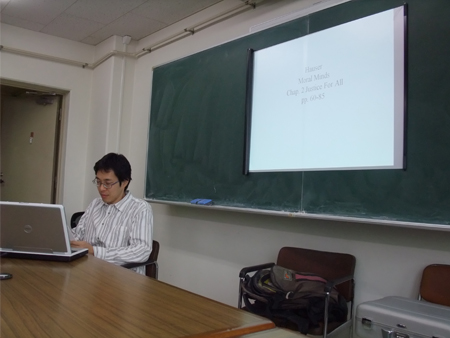中期教育プログラム「脳科学と倫理」セミナー(5)第3回報告
中期教育プログラム「脳科学と倫理」の活動をご報告します。セミナー5 「ハウザーを読む」では、Marc D. Hauser の Moral Minds を講読しています。今回はその第3回報告、第2章の前半 (pp. 59-84) を検討します。
【プレゼンテーション】 峰理哉さん (東京大学大学院)
Hauser's Moral Minds". 第2章前半 PDF (181KB)

【報告】 佐藤亮司さん (若手研究員)
In the third session, we read the first half of chapter 2. In the chapter, Hauser focused on justice. Following Rawls, he regarded justice as fairness. First, he introduced Rawls’s idea of justice. In chapter 1, Hauser endorsed a Rawlsian position of morality: there are underlying moral principles inaccessible to consciousness. Rawls aimed to capture these principles by a thought experiment including his famous veil of ignorance. Through the thought experiment, he tried to convince us of his principles of justice, appealing to our sense of justice. His view has two principles: the first one is that every member of society has equal right to basic liberties, and the second one is that social and economic goods should be distributed so as to benefit the least advantaged members of society (the difference principle).
After Hauser introduced Rawls’s two principles, Hauser scrutinized cultural variances of principles of justice. For this purpose, he first examined the evolution of fairness, referring to evidence from famous games in experimental economics such as the dictator game, the ultimatum game, and the public-goods game. Based on these data, he concluded that people in western industrialized nations have evolved a unique psychology through their history: strong reciprocity. An individual equipped with strong reciprocity has predispositions not only to cooperate with others, but also to punish violators of the norms of cooperation at personal cost. But when we looked at different cultures, strong reciprocity does not always hold. Any cultural group has a sense of justice, but the standards of what counts as fairness are different. In sum, Hauser argued that we have only one set of underlying universal principles of justice, but once parameters are set, we have apparently different principles of justice*.
In this chapter, Hauser largely accepted and recognized the effectiveness of Rawls’s methodology. However, Hauser implied that Rawls’s principles can be wrong: we have different principles of justice. But as we discussed in the session, Rawls envisaged his principles of justice as what all agents who can understand his methodology come to agree. Thus, Hauser’s view is controversial. He has two options: accepting Rawls’s principles of justice or giving up his methodology. I think Hauser should have criticized Rawls’s methodologies rather than accepting them, because Rawls tried to discover universal principles relying on intuitions of only some people. But examining enormous data, Hauser revealed that our intuitions are not universal and thus, universal principles cannot be discovered by mere intuitions. We should discover our underlying principles of morality through empirical investigations of various intuitions of justice.
* Hauser used the key word “principle” in two ambiguous meanings. In some cases, he referred to universal principles which are not accessible to our consciousness, but in other cases, he also calls norms in which parameters were already set “principles”. Since this difference seems significant, he should have avoided this ambiguity.
PDF版をダウンロード⇒
【レポート】Hauser's Moral Minds". 第2章前半 PDF (38KB)






